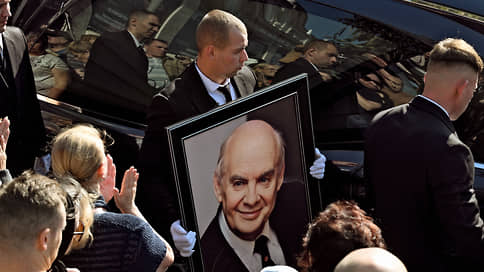In Moscow they said goodbye to the poet Nikolai Dobronravov
[ad_1]

On Wednesday in Moscow they said goodbye to Nikolai Dobronravov. He died on September 16 at the age of 94 after a long illness. At the farewell ceremony they said that the poet “voiced an entire era with his poems,” but mainly expressed condolences to the widowed Alexandra Pakhmutova, with whom Mr. Dobronravov wrote most of his works.
Farewell to Nikolai Dobronravov took place in the concert hall. P.I. Tchaikovsky. The coffin with the poet’s body was brought here after the funeral service in the Sretensky Monastery, which was attended only by those closest to him. The civil memorial service was scheduled to begin at one o’clock in the afternoon, but already at noon people began to crowd in front of the entrance.
Nikolai Dobronravov graduated from the Studio School named after. V.I. Nemirovich-Danchenko and starred in several films, but became famous as the author of song lyrics. Among the most famous are “Belovezhskaya Pushcha”, “A Coward Doesn’t Play Hockey”, “How Young We Were”, “Do You Know What Kind of Guy He Was”, “And the Fight Continues Again”, “Goodbye, Moscow” (farewell song of the Olympics -80). The music for them was written by his wife Alexandra Pakhmutova, with whom the poet lived in marriage for almost 70 years.
The poet’s admirers, mostly elderly people, occupied the raised lawn and asked the guards whether the widow would be present at the farewell. The young girl, sobbing loudly, explained that she was here “for her grandmother, who always considered Alexandra Nikolaevna the main star”: “I came to support her, she needs support, she (Alexandra Pakhmutova.— “Kommersant”) without him (Nikolai Dobronravov.— “Kommersant”) will no longer be able to be just fragile Alechka.”
Having strictly forbidden filming what was happening, those who came were allowed into the Philharmonic Hall, where a coffin stood on the stage, surrounded by dozens of wreaths and bouquets of red roses. Flowers were brought by singer Zara, who explained to journalists that for her “Pakhmutova and Dobronravov are guardian angels,” hockey coach Alexander Yakushev, who thanked the couple for “a real anthem, which was the song “Cowards Don’t Play Hockey!”,” and his colleague Vladislav Tretyak. The appearance of the leader of the Communist Party of the Russian Federation Gennady Zyuganov caused excitement in the crowd, but the politician refused to comment. Bouquets from ordinary visitors were laid out along the edges of the stage: among the roses, the smell of which filled the entire room, a bright sunflower grew lonely and yellow.
Meanwhile, songs were heard in the hall, poems for which were written by Nikolai Dobronravov. The quickly filling first tier of the Philharmonic began to buzz: the ceremony had not yet begun. Despite the remarks of the stewards, some tried to capture what was happening on their phones and again wondered whether “Alexandra Nikolaevna would come,” discussing whether there was room left for her at the coffin. Doubts were dispelled by the voice of the presenter, who explained that “due to the epidemiological situation, the relatives made the difficult decision to limit all contacts of Alexandra Nikolaevna with those present,” but the widow would still come. As if confirming the fears, there were coughs from different ends of the hall.
A man in the back row showed others a collection of poems by Nikolai Dobronravov, signed by the author. “I always valued him, but now he has become priceless,” he said proudly.
The ceremony began an hour late, when Alexandra Pakhmutova arrived, accompanied by security. The presenter spoke for a long time about the fact that Nikolai Dobronravov was a patriot of his country, quoted lines from his works (“But all my songs and poems are a Prayer for the salvation of Russia”), and then read out a long stream of government telegrams, which the assistant delivered right during reading. Condolences to the poet’s widow were expressed by Russian President Vladimir Putin, who called Nikolai Dobronravov “the people’s favorite,” Prime Minister Mikhail Mishustin, Ministers of Defense Sergei Shoigu and Minister of Culture Olga Lyubimova, as well as President of Belarus Alexander Lukashenko.
“A whole era has passed from us, which Nikolai Nikolayevich voiced with his poems,” said singer Lev Leshchenko, who was the first to speak at the funeral service. “They are all incredibly eventful and reflect our entire history.” The idea about the significance of the poet’s work for the country was continued by the artistic director of the Russian Army Song and Dance Ensemble. A. V. Alexandrova Gennady Sachenyuk. Turning to the widow, he thanked her “for the songs heard throughout the world.” “You gave our ensemble a song, it’s called: “Alexander’s Song,” I want to paraphrase the lines from there and promise: “And as long as Russia lives, your song will live.”
Words of support were also heard from actor Avangard Leontyev and actress Ekaterina Guseva. The speakers approached Alexandra Pakhmutova and bowed before her. Among them was a family friend, singer Julian.
Another friend of the family, surgeon Leonid Roshal, concluded the farewell. “You have lost the opportunity for physical communication with Kolya, this is difficult to underestimate, but we will try to do everything possible to brighten up your grief,” he promised the widow of Nikolai Dobronravov.
After this, Alexandra Pakhmutova silently approached her husband’s coffin, where she stood in tears for almost ten minutes, and then asked the guests to leave the hall.
The coffin was carried out of the Philharmonic to applause. The guards again began to drive those gathered from the lawns on the hill, cursing that the citizens were trampling on the grass. One of the stewards sadly noted that “today everyone was talking about Pakhmutova, although her husband actually died.” Someone in the crowd responded: “Dobronravov himself would have wanted this.”
The hearse with the body of Nikolai Dobronravov left for the Novodevichy cemetery.
[ad_2]
Source link








